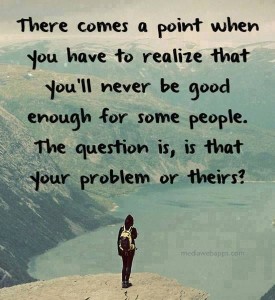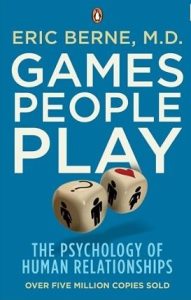Does your partner degrade or belittle you? Publish details about you or your relationship online? If you think that just because you aren’t being physically abused then nothing is wrong, think again. Ever since the April 2010 article You Carry the Cure In Your Own Heart, I have been interested in how emotional abuse can have devastating consequences on both physical and mental health. This subject has created more feedback than just about anything on the site. Where do you start to look for help?

While emotional or psychological abuse may be difficult to pinpoint, examples abound. Here are some characteristics:
- Using money as a lever to control you
- Making you afraid of consequences by using looks, gestures or actions
- Distorted self-image, they can fool themselves too
- Controlling by minimizing, denying and blaming
- Making light of their behaviour and not taking your concerns about it seriously
- Regularly criticizing you, calling you names, shouting at you, using sarcasm
- Unpredictable, putting you down or humiliating you in private, but acting charming in public, or fluctuating between the two
- Cultivating a caring persona with others important to them, in other words, two-faced.
- Withholding approval, appreciation or affection as punishment.
No matter how attractive, young, old or smart a person is, he or she can be a victim of emotional abuse. There may be many explanatory factors, familial traits, upbringing, abuse they themselves have possibly suffered, etc. but in an equal relationship you are not the therapist. Lets look at some signs of an abusive partner in detail. If they are:
Verbally abusive
If someone calls you derogatory names, even if they say they are joking, they mean to hurt you and keep you in line. Abusers sometimes cover themselves by blaming you, saying that you need to lighten up or that you are too sensitive. You are not too sensitive; you have a gut feeling that this is not the way you want to be treated.
Isolating you
Emotionally abusive people want you all to themselves. They do not want to understand that you have a life outside of the relationship – one that includes family and friends. It is healthy and normal for you to spend time with other people, so if your partner prevents you from doing so, this may be a sign of an emotionally abusive relationship.
Blaming Others
If your partner blames things on someone else, especially you, this may be one sign. If he throws a tantrum or attacks you verbally, he will claim it was because of you. It is not a sign of a healthy relationship if your partner rarely takes responsibility and never admits to being at fault.
Alcohol and drug use?
Not all abusers use drugs or drink excessive alcohol, in actuality some are proud never to do so, but many do. An addiction can lead to erratic and inappropriate behaviour. Substance abuse is very often a gateway to emotional abuse and an unhealthy relationship.
Instills fear
If you ever feel fear around your partner, there is something very wrong. Abusers may try to intimidate you with violence, dominant behaviour or power tactics. For example, intentionally putting you in harmful situations (driving recklessly with you as a passenger, for example) or fantasising about doing so.
Punishes you for time away
This goes along with the isolation technique, where abusers want you all to themselves. They cannot tolerate ” time-out “, you trying to take a step back. If you do go somewhere or do something without your partner, or even if he or she goes along but others are also there, an emotional abuser will punish you later. An abuser may shout, insult, threaten or worse, all because you were not exclusively with him.
Expecting you to be their servant
An emotional abuser can go through life acting as if entitled to be treated like royalty, and wanting you to be a willing servant. He expects you to do everything and is capable of seldom helping at all.
Is extremely jealous
A prominent trait of abusers is their jealousy. An abusive partner or spouse can be very jealous of you, and even your dreams and goals. Their jealousy and rage over intangible things like your aspirations stems from the lack of control they feel over those aspects of your life.
Controls you through emotions
An abuser is an arch manipulator and will sulk, threaten to leave or walk away mid-conversation, emotionally punishing you for not following their ideas of how things should be. They may answer you by completely changing the subject. An abuser will try to make you feel guilty any time you express yourself and assert what is right for you. At times the abuser may appear to be apologetic and loving; the abuse begins again when the abuser feels he or she has your forgiveness.
Gets physical
If you are in an emotionally abusive relationship, there is a good chance that eventually things will get physical. At first, the abuser might pull your hair, push you, or grab you so hard that you bruise; these may only be warning signs that things can escalate further.
Both men and women can be victims
It is important to remember that while emotional abuse is often thought of as being committed by a man against a woman, women can also emotionally abuse men, or abuse can be between members of the same sex. Parents or siblings can emotionally abuse. Emotional abuse in any relationship is not acceptable. The problem exists in the workplace, school, church, any place people interact.
Emotional Abuse: The Victim and Abuser
An emotionally abusive relationship consists of a victim and an abuser. Here are some questions for them both.
Questions for the Abuser:
Have you thought about how your actions truly affect your partner? Even when you stop the abuse, the pain continues because you’ve trampled on your loved one’s heart and soul. Considering someone’s feelings includes what you say on social media sites.
An abuser is both a coward and a bully. They choose to abuse where they think they are safe, in a place where their partner should feel loved and protected. Would they do it in the workplace where they might get fired, or in a social situation where others might witness it?
You need to understand that respect is earned, not demanded. If you think degrading and belittling your partner earns respect, you’re wrong. You are simply demanding by imposing fear.
All abusers have excuses. While the excuses vary, one principle remains: You are abusing instead of being constructive.
If you want to recover — for yourself and your partner — you need to tell yourself: “I’m not going to take this from me anymore.” Sit down with your partner, look into their eyes, and apologize for the wounds you’ve inflicted over time. And this time, mean it.
Healing is a process. Rescuing your relationship will take patience and persistence. Hear your partner out, don’t walk away with an excuse. Manipulating other people is just plain wrong.
Questions for the Victim:
Take responsibility. You have played a role in setting up the relationship this way, and you must play a role in changing it. Telling your partner that the treatment is unacceptable is not enough. Your actions speak louder than words, so you need to make two bold moves: Change your own routine or behaviour, and tell your partner you will no longer take the abuse.
There is a saying: “There are no victims, only volunteers.” Don’t go along to get along. Peace at any price is no peace at all.
Relationships are always up for renegotiation. You need to sit down with your partner, look them in the eyes, and tell them that you are taking a stand. You will not stay in the relationship if the abuse continues. Make sure they know you mean it. From there, begin to negotiate. Figure out how both of you can take strides to make the relationship work.
Watch yourself to make sure you don’t fall back into the victim role. Abuse will never end overnight.
Consider the negotiation from a safe distance. Separate if necessary. You may have forgotten what life was like before your abusive partner was the centre of it.
Last year in Brazil during a clash between protesters and armed forces, a General sought peace because it was his birthday! The incredible outcome was the sight of protesters producing a cake for him. The message has to be that humanity and simple kindness is more powerful than anger and violence..
Signs Your Friend May Be in an Abusive Relationship
Thousands of young adults find themselves in relationships that are controlling, manipulative and sometimes physically abusive. Some research shows that 98 percent of teenage girls who have been abused continue to date the abuser. Your friend could be one of them.
If you suspect they are in an abusive relationship, the following are some classic warning signs to watch out for.
- She apologizes for his behaviour and makes excuses for him.
- She loses interest in activities that she used to enjoy, she may lose pride in her appearance.
- She stops seeing friends and family members and becomes more isolated.
- When your friend or daughter and her boyfriend are together, he calls her names and puts her down in front of other people, or what he posts online.
- He can act extremely jealous of others who pay attention to her, especially other guys.
- He tells her that you don’t like him.
- He controls her behaviour, checking up on her often constantly, calling and texting her, demanding to know what she has been doing.
- She casually mentions his controlling behaviour, but he just laughs it off as a joke.
- She may have unexplained injuries, or the explanations she offers don’t make sense. She may be anxious, or display other symptoms of stress-related illness.
- You witness him lose his temper, throwing or breaking objects.
Thank you for reading the article through. Abuse is perhaps one of the most difficult aspects of our behaviour, and it must be acknowledged we all make mistakes. I have tried to generalize the personal traits described specifically so that no one person may feel offended. Few individuals in any case would display all the characteristics even over time. However, just as in reality, to say nothing, do nothing just buys into abuse.
Thanks to:
http://www.danielgoleman.info/
Games People Play: The Psychology of Human Relationships< by Eric Berne, M.D.


